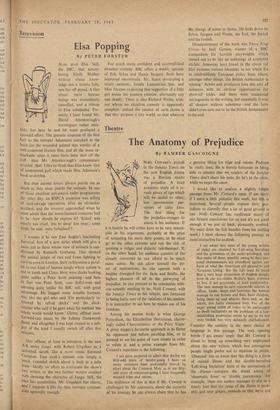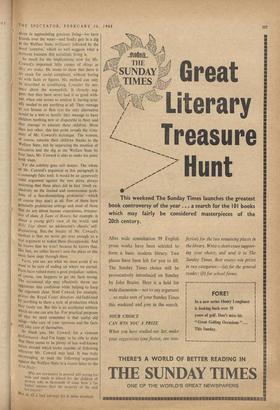Theatre
The Anatomy of Prejudice
By BAMBER GASCOIGNE • Nal COWARD'S assault
in the Sunday Times on the new English drama was a flawless model of prejudice. A brief academic study of it re- veals plenty of tips which will be useful to other, less spontaneous pur- veyors of Mies fixes. The first thing for the prejudice-monger to assess is his audience. If it is hostile he will either have to be very reason- able in his arguments, probably at the price of scrapping his more fiery points, or he must go to the other extreme and run the risk of seeming a vulgar and didactic tub-thumper. If, on the other hand, his audience consists of the already converted he can afford to be much more subtle. He can allow himself the sly- est of insinuations, he can operate with a healthy disregard for the facts and finally, the highest pleasure of all in the purveying of prejudice, he can pretend to be reasonable with- out actually needing to be. Noel Coward, with the Sunday Times as his vehicle, was fortunate in being fairly sure of the opinions of his readers. It is instructive to see how he makes use of his freedom.
Among his neatest tricks is what George Puttenham, the Elizabethan rhetorician, charm- ingly called Charientismus, or the Privy Nippe. A privy nipper's favourite approach is to flatter his opponent just before pinching him, or to pretend to see his point of view simply in order to refute it, and a prime example from Mr. Coward's repertoire is the following : I am quite prepared to admit that during my fifty-odd years of theatre-going I have on many occasions been profoundly moved by plays about the Common Man, as in my fifty- odd years of restaurant-going I have frequently enjoyed tripe and onions.
The brilliance of this is that if Mr. Coward is challenged by his opponents about the sincerity of his analogy he can always claim that he has a genuine liking for tripe and onions. Perhaps he really does. He is merely fortunate in being able to assume that we readers of the Sun flay Times don't share his taste. So he's in the dear, while we enjoy the sneer.
I would like to analyse a slightly !anger passage from Mr. Coward's opus. (I am sdrry if I seem a little pedantic this week, but this is important. Several people express their pre- judices so clumsily that a lot of good grout.id is lost. Noel Coward has confirmed mangy!' of our firmest convictions for us and it's not good enough if we just sit back, pleasantly soothed. We must draw the full benefits from his sterling work.) I have chosen the following passage as most instructive for analysis : I am aware that most of the young writers of today are obsessed by Left-wing Socialism and the grievances of the under-privileged, and that many of them, possibly owing to their-per- sonal circumstances, are prejudiced against any form of what the Americans are pleased to call 'Gracious Living.' But the fact must he faced that a very large proportion of English people, even in our tax-ridden Welfare State, contrive to live, if not graciously, at least comfortably. The men manage to earn reasonable salaries in offices, banks, shops and factories; the women manage to run houses and flats, have children, bring them up and educate them and, on the whole, live fairly contented lives. For all the eager young talent of today to be encouraged to dwell exclusively on the problems of a fast- diminishing proletariat seems to me to he not only foolish but very definitely old-fashioned.
Consider the subtlety in the mere choice of language in this passage. The very opening words 'I am aware' imply that Mr. Coward is about to bring up something very unpleasant about the new writers which less courageous people might prefer not to mention in public. 'Obsessed' lets us know that this thing is a form of mental illness and the double-barrelled 'Left-wing Socialism' hints at the seriousness of the disease—compare the dread sound of 'rheumatic fever' or 'double pneumonia,' for example. Then our author manages to slip in a timely hint that the cause of the illness is prob- ably just sour grapes, reminds us that we're. not alone in appreciating gracious living—we have friends over the water—and finally gets in a dig at the Welfare State, brilliantly followed by the word 'contrive,' which so well suggests what a tortuous business this socialistic living is.
So much for the implications; now for Mr. Coward's important little cameo of things as they are today. He wants to show that there is no cause for social complaint, without boring US with facts or figures. His method can only be described as scintillating. Consider his sen- tence about the womenfolk. It cleverly sug- gests that they have never had it so good with- out. when one conies to analyse it. having actu- ally needed to say anything at all. They manage to run houses or flats (yet the only alternative would be a tent or hovel): they manage to have children (nothing new or disputable in this): and they manage to educate these children. More than any other, this last point reveals the virtu- osity of Mr. Coward's technique. The women. of course, educate their children thanks to the Welfare State, but by separating the mention of education and the dig at the Welfare State by four lines, Mr. Coward is able to make his point both ways.
Yet the subtlety goes still deeper. The whole of Mr. Coward's argument in this paragraph is a cunningly false trail. It would be an apparently valid argument against the new plays, always assuming that these plays did in fact 'dwell ex- clusively on the limited and monotonous prob- lems of a fast-diminishing proletariat'--which of course they don't at all. Few of them have genuinely proletarian settings and most of those that do are about human experiences, irrespec- tive of class. A Taste of Honey, for example. is about a young girl's view of the world, and Billy Liar about an adolescent's chaotic- self- dramatising. But. the beauty of Mr. Coward's method is that we never get near enough to a real argument to notice these discrepancies. And he knows that we won't because he knows that, like him, we either haven't seen the plays or else must have slept through them.
Facts, you see. are what we must avoid if we want to be sure of ending up where we started. Facts have ruined many a good prejudice—unless, of course, one happens to get the facts wrong. The occasional slip may effectively throw our oPponents into confusion while helping to keep the argument clear. Noel Coward, for example, Proves the Royal Court directors old-fashioned by ascribing to them a style of production which they rarely use. But this is an accidental subtlety Which no one can aim for. For practical purposes all that we need remember is that useful old adage--take care of your opinions and the facts Will take care of themselves.
So thank you, Mr. Coward, for a virtuoso performance. And I'm happy to be able to state that there seems to be plenty of less well-known talent around which looks capable of following Wherever Mr. Coward may lead. It was truly encouraging to read the following argument against the Welfare State in a recent letter to the New Daily : Why are tax-payers in general still paying for milk and meals at school for the children of parents who in thousands of cases have a far higher income than the majority of the said tax-payers? Not at all a bad attempt for a mere amateur.











































 Previous page
Previous page